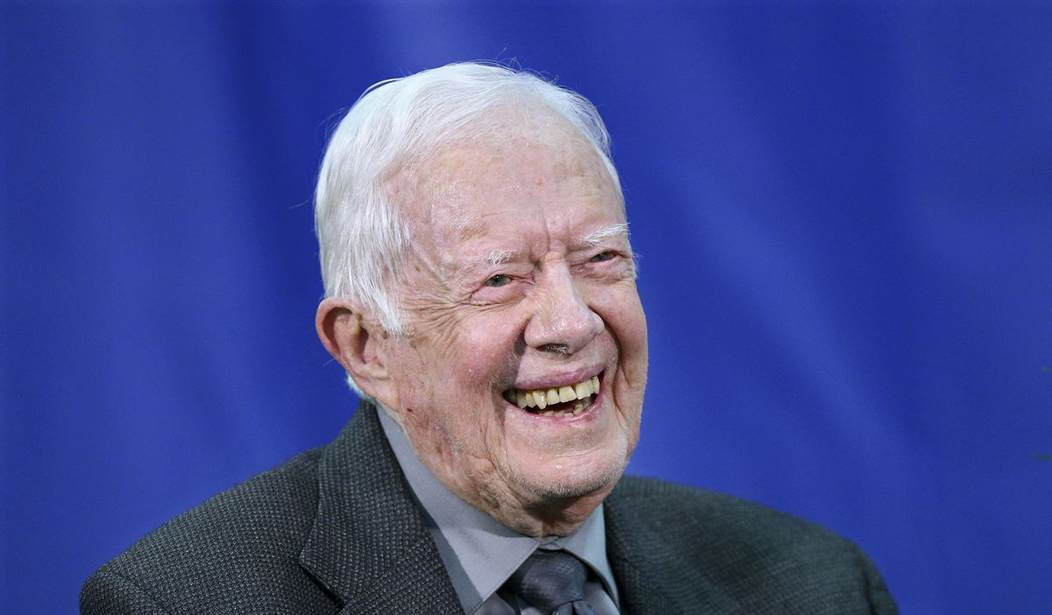It is no surprise that President Joe Biden’s first trip after his Wednesday night address to Congress was to Plains, Georgia. Biden visited his oldest living predecessor, President Jimmy Carter. Fittingly enough, barely 100 days into Biden’s term, his vision and performance on national security are beginning to mirror that of America’s 39th chief executive.
First elected to the Senate in 1972, Biden long has admired Carter. Indeed, Biden was the first senator to endorse the former Georgia governor in his outsider’s presidential bid in 1976. Carter returned the favor 44 years later. After staying neutral in the 2020 Democrat primary, he endorsed Biden in a video for the party’s national convention.
Although Biden ran as a four-decade Washington insider with long foreign policy credentials – precisely the opposite of Carter’s lack of national security experience in 1976 – the two presidents closely resemble each other in how they see America’s place in the world as well as the strategic challenges before them.
Carter notched some important foreign policy wins in his one term, most notably the 1978 Camp David Accords, which culminated in a peace treaty between Egypt and Israel a year later. However, Carter faced numerous setbacks that signaled weakness in international affairs. Carter’s vacillation and appeasement contributed mightily to his landslide loss to Ronald Reagan in 1980.
Chief among Carter’s failures was the Iranian hostage crisis that began in November 1979, and the subsequent botched Desert One rescue attempt in April 1980.
Carter’s security migraines were not limited to Iran. Early in his presidency, he gave away the Panama Canal via a 1977 treaty negotiated with that Central American nation. A year later, he first recognized the Communist People’s Republic of China, and severed diplomatic relations with Taiwan. Soviet forces invaded Afghanistan in 1979, beginning a 10-year occupation that Carter struggled to address for the remainder of his presidency, eventually prompting his decision to force the U.S. team to boycott the 1980 Olympic Summer Games in Moscow.
Recommended
Now, over four decades later, the parallels are striking between Carter’s security record and Biden’s hundred days of national security tests and responses.
The Communist People’s Republic of China has grown in 42 years from diplomatic recognition to America’s chief global competitor in every important sphere – militarily, economic, and technological. China aggressively confronts the U.S. on every geostrategic front, including Taiwan.
The Biden administration’s response to the Chinese Communists has proved halting, at best. At Team Biden’s first meeting with Team Xi in Anchorage, Alaska, in March, Secretary of State Antony Blinken and National Security Adviser Jake Sullivan politely sat and let their Chinese counterparts lecture them on America’s alleged failures on race and human rights. Biden himself has demonstrated Carteresque weakness by failing even to question President Xi about his Party’s foisting the COVID-19 virus on the world, and how to compensate America and virtually every other country for doing so.
Afghanistan remains front-and-center in U.S. security policy some 40 years after Carter’s struggles there. Biden faces his own difficulties, this time in winding down America’s two-decade military engagement there. Biden already missed a Trump-imposed May 1 deadline for withdrawing U.S. forces and has set September 11 as the new target, a move that brings its own set of additional risks for our service members.
While the Red Army no longer is poised to invade a Central Asian country, as it did under Carter, Russian President Vladimir Putin instead masses troops to the west, on Ukraine’s border. Putin is signaling a possible move into that country, reprising his 2014 forced takeover of Crimea under the Obama-Biden administration. As it was seven years ago – and in Carter’s response to the Kremlin’s attack on Afghanistan 42 years ago – few good options remain for Biden to deter a Russian move on Ukraine.
On the central security challenge to Carter’s presidency – dealing with Iran’s revolutionary leaders – Biden is demonstrating similar fecklessness. This time, he is telegraphing possible concessions on President Trump’s tough sanctions regime, to bring Tehran back into Obama-Biden’s vaunted Iran-nuclear deal.
There are some national-security contrasts between Biden and Carter. Regarding virtue-signaling clothing mandates on their fellow Americans, Biden promotes anti-COVID masks, to a fault, while Carter pushed energy-saving cardigan sweaters. And on Olympic boycotts, there are no Games in Moscow this year. But just last month, Biden’s State Department opened the door to a U.S. pullout of Beijing’s 2022 games over human rights abuses — and then walked back that idea the same day. The judges apparently are still out on that one. All told, when it comes to Biden and national security, it’s Welcome Back, Carter.
John Ullyot was Deputy Assistant to the President for National Security Affairs and NSC Spokesman from 2019-2021.

























Join the conversation as a VIP Member